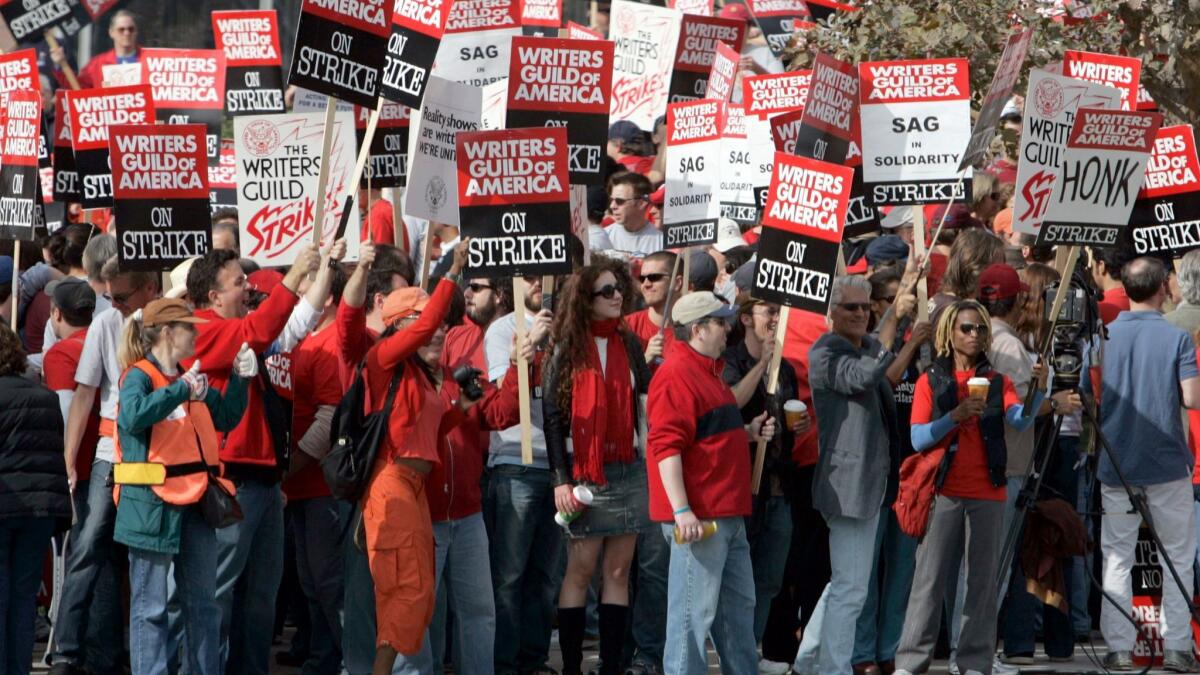Writers Guild of America members authorize strike as contract deadline looms

- Share via
In a sign of rising labor tensions in Hollywood, members of the Writers Guild of America voted overwhelmingly Monday to authorize a strike just a week before the union’s contract is set to expire May 1.
Although the vote is largely seen as a negotiating tactic to put pressure on the studios, it moves the union one step closer to a work stoppage that would have widespread repercussions throughout the film and TV industry.
The guild said 96.3% of the 6,310 writers who cast ballots voted in favor of the measure, which gives leaders the authority to call a strike if negotiations fail. The union said 67.5% of eligible WGA members voted, describing it as “a historic turnout.” The union has nearly 13,000 members.
During the last writers walkout in 2007, members voted 90% in favor of granting a strike authorization.
Though a strike authorization was widely anticipated, the near unanimous support from guild members could give negotiators more leverage in negotiations with the major studios.
“We thank you for your resolve and your faith in us as your representatives. We are determined to achieve a fair contract,” the union’s negotiating committee said in an email to members Monday.
A strike could still be avoided if the two sides reach an agreement by the deadline next week.
Negotiations between the guild and the Alliance of Motion Picture and Television Producers is scheduled to resume Tuesday, giving the two sides just a week to resolve their differences before a strike goes into effect.
The alliance, which represents the major Hollywood studios and broadcast networks, said in a statement Monday that its members are “committed to reaching a deal at the bargaining table that keeps the industry working.”
The industry group said writers lost more than $287 million in compensation during the last WGA strike in 2007-08. “The 2007 writers strike hurt everyone,” the alliance said.
The two sides have been locked in contentious negotiations over issues of compensation and benefits. The union is asking for pay increases, including bigger residuals for shows streamed on Netflix and Amazon, and increased employer contributions to its health plan, which has faced deficits in recent years.
“None of us want a strike,” Chris Keyser, co-chair of the WGA’s negotiating committee, said in a podcast produced by the guild before the strike authorization vote. But he said the guild’s biggest piece of leverage in negotiations “is either the threat of or the actual practice of a strike.”
The committee stated that a strike authorization isn’t meant to create anxiety among its membership, but rather give the guild a concrete negotiating window.
Writers say corporate profits and executive compensation have risen at a time when many WGA members are having trouble making ends meet, even for staff writers on popular TV shows.
Their problems come at a time of abundance in the world of scripted TV production as cable and streaming companies are producing more original, high-quality series — a phenomenon often referred to as “peak TV.” But shorter seasons combined with exclusivity contracts that prevent writers from working on more than one series at a time means that many writers aren’t sharing in the prosperity. In the last two years, the average salary for a TV writer-producer has declined 23%, according to the WGA.
Talks began in March and have been marked by discord. The two sides walked away from the table March 24. The guild has argued that the studios have engaged in a misinformation campaign by saying that the writers walked away first — a claim that the writers have denied.
The WGA has asked for increases in compensation, including a 3% increase in minimums and the payment of script fees for its lowest-paid members. But the guild said the studios have said ‘no’ to almost all of its demands.
In addition, the union says that the studios have proposed cuts to its health plan and have balked at increasing employer contributions.
The last WGA strike in 2007-08 lasted 100 days, disrupting TV and movie production throughout the entertainment industry.
UPDATES:
6:45 p.m.: This article was updated with additional details on the strike authorization vote.
This article was originally published at 4:45 p.m.
More to Read
Inside the business of entertainment
The Wide Shot brings you news, analysis and insights on everything from streaming wars to production — and what it all means for the future.
You may occasionally receive promotional content from the Los Angeles Times.











